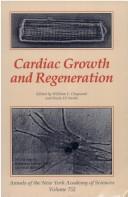| Listing 1 - 3 of 3 |
Sort by
|
Book
ISBN: 0879693002 9780879693008 Year: 1987 Publisher: Cold Spring Harbor laboratory
Abstract | Keywords | Export | Availability | Bookmark
 Loading...
Loading...Choose an application
- Reference Manager
- EndNote
- RefWorks (Direct export to RefWorks)
Neovascularization --- Growth factors --- Neovascularization, Pathologic --- Neovascularization, Physiologic --- Congresses --- Physiological effect --- Congresses. --- Angiogenesis --- Blood-vessels --- Cell growth factors --- Cellular growth factors --- Growth peptides --- Growth promoting substances --- Growth substances --- Peptide growth factors --- Peptide regulatory factors --- Polypeptide growth factors --- Cytokines --- Peptides --- Physiological effect&delete& --- Growth --- Neovascularization - Congresses --- Growth factors - Physiological effect - Congresses --- Neovascularization, Pathologic - congresses --- Neovascularization, Physiologic - congresses

ISBN: 0897669290 0897669304 Year: 1995 Volume: 752 Publisher: New York, NY : New York Academy of Sciences,
Abstract | Keywords | Export | Availability | Bookmark
 Loading...
Loading...Choose an application
- Reference Manager
- EndNote
- RefWorks (Direct export to RefWorks)
Cardiomyopathy, Hypertrophic --- Cardiovascular System --- Growth Substances --- Muscle, Smooth, Vascular --- Heart cells --- Heart --- Neovascularization --- growth and development --- cytology --- physiopathology --- Congresses --- Growth --- Hypertrophy --- CARDIOMYOPATHY --- CARDIOVASCULAR SYSTEM, growth & development --- CARDIOVASCULAR SYSTEM, physiopathology --- GROWTH SUBSTANCES --- MUSCLE --- Congresses. --- HYPERTROPIC --- SMOOTH, VASCULAR, cytology --- congresses. --- growth & development --- Growth & development --- Physiopathology --- Cytology --- Cardiomyopathy --- Cardiovascular system, growth & development --- Cardiovascular system, physiopathology --- Cardiomyopathy, hypertrophic --- Cardiovascular system --- Growth substances --- Muscle --- Muscle, smooth, vascular --- Hypertropic --- Smooth, vascular, cytology --- Heart cells - Congresses. --- Heart - Growth - Congresses. --- Neovascularization - Congresses. --- CARDIOMYOPATHY, HYPERTROPHIC --- CARDIOVASCULAR SYSTEM --- MUSCLE, SMOOTH, VASCULAR --- GROWTH AND DEVELOPMENT --- PHYSIOPATHOLOGY --- CYTOLOGY
Book
ISBN: 940178034X 9401780358 Year: 2014 Publisher: Dordrecht : Springer Netherlands : Imprint: Springer,
Abstract | Keywords | Export | Availability | Bookmark
 Loading...
Loading...Choose an application
- Reference Manager
- EndNote
- RefWorks (Direct export to RefWorks)
It has been generally accepted that angiogenesis is involved in the pathogenesis of hematological malignancies, like acute and chronic leukemia, lymphoma, myelodysplastic syndromes, myeloproliferative neoplasms and multiple myeloma. The extent of angiogenesis in the bone marrow has been correlated with disease burden, prognosis and treatment outcome. Reciprocal positive and negative interactions between tumor cells and bone marrow stromal cells, namely hematopoietic stem cells, fibroblasts, osteoblasts/osteoclasts, endothelial cells, endothelial progenitor cells, T cells, macrophages and mast cells, mediated by an array of cytokines, receptors and adhesion molecules, modulate the angiogenic response in hematological tumors. More recently, it has been emphasized the pro-angiogenic role of the so called “vascular niche”, indicating a site rich in blood vessels where endothelial cells and mural cells such as pericytes and smooth muscle cells create a microenvironment that affects the behavior of several stem and progenitor cells, in hematological malignancies.
Growth factors --Physiological effect -- Congresses. --- Neovascularization -- Congresses. --- Neovascularization. --- Leukemia --- Neovascularization --- Neovascularization inhibitors --- Angiogenesis Modulating Agents --- Diseases --- Hematologic Diseases --- Neoplasms by Site --- Metaplasia --- Antineoplastic Agents --- Growth Inhibitors --- Hemic and Lymphatic Diseases --- Growth Substances --- Pathologic Processes --- Therapeutic Uses --- Pathological Conditions, Signs and Symptoms --- Pharmacologic Actions --- Physiological Effects of Drugs --- Chemical Actions and Uses --- Chemicals and Drugs --- Angiogenesis Inhibitors --- Hematologic Neoplasms --- Neoplasms --- Neovascularization, Pathologic --- Medicine --- Health & Biological Sciences --- Oncology --- Therapeutic use --- Hematological oncology. --- Angiogenesis Inducing Agents. --- Tumors --- Blood-vessels. --- Cancer --- Blood-vessels --- Medicine. --- Cancer research. --- Hematology. --- Oncology. --- Life sciences. --- Biomedicine. --- Cancer Research. --- Life Sciences, general. --- Hematology --- Oncology . --- Biosciences --- Sciences, Life --- Science --- Haematology --- Internal medicine --- Blood --- Cancer research
| Listing 1 - 3 of 3 |
Sort by
|

 Search
Search Feedback
Feedback About UniCat
About UniCat  Help
Help News
News